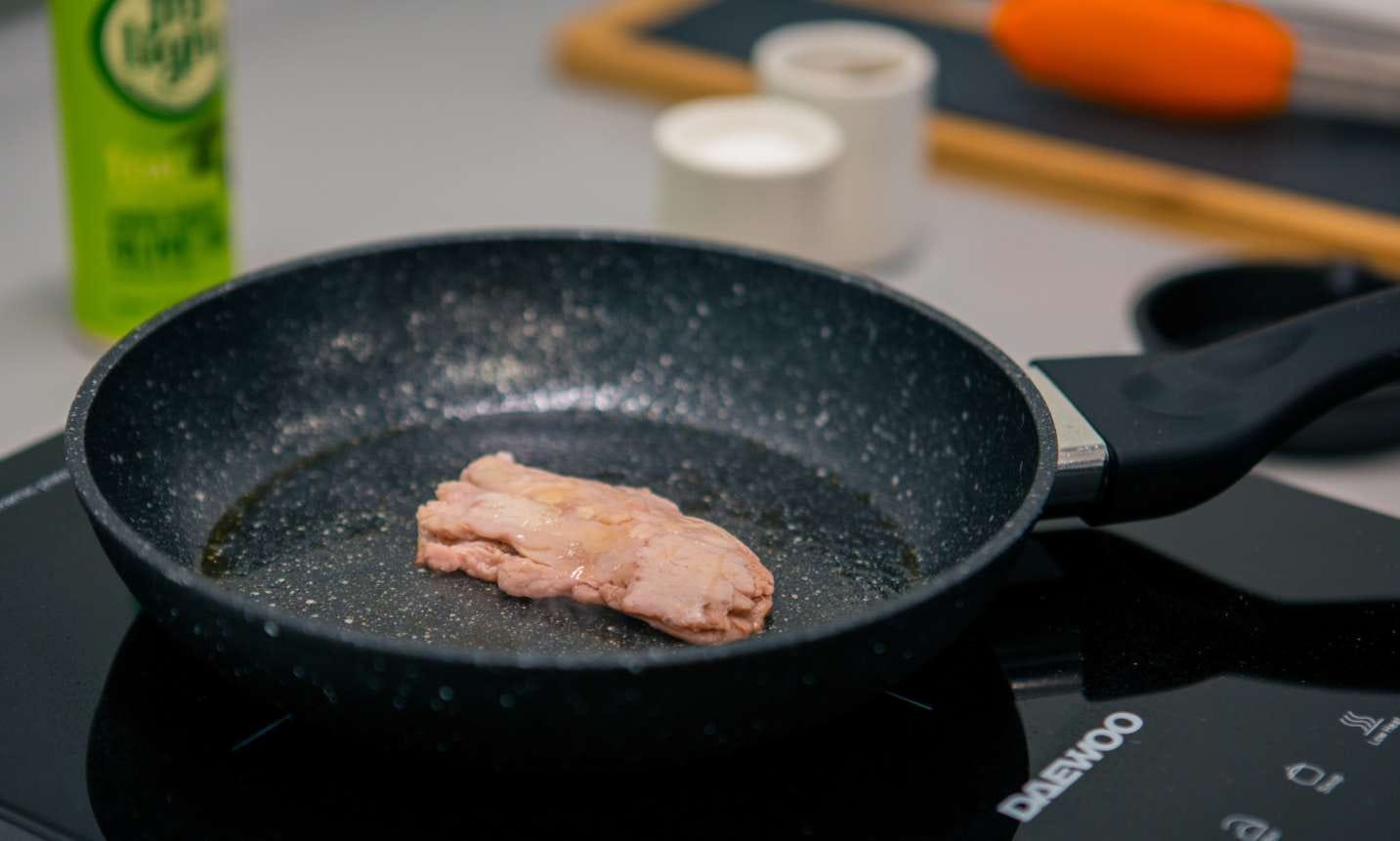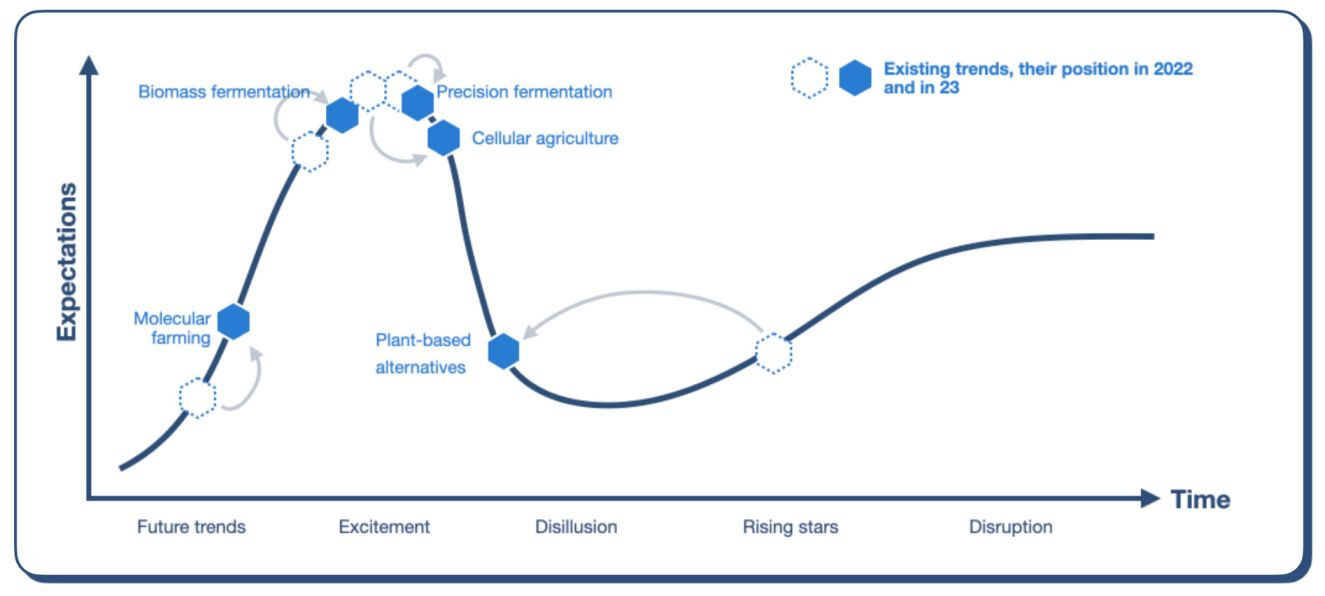UNEP Endorses Alt Proteins at COP28, £2B UK Plan for the Biotech Revolution, and Landless Microbial Proteins
Also: Four founders share what Asian consumers want from plant-based meat products
Hey there!
The holiday season is around the corner, and I’m currently visiting my family in Sri Lanka 🇱🇰🙌🏾
This will be the last edition for 2023. I’ll return to your inboxes in January 2024.
BIO BUZZ
🤝 BSF and CellRev formed a new company, Cultivated Meat Technologies (CMT), with a focus on mass-producing cultivated meat
CMT aims to leverage both companies' technological expertise and manufacturing capabilities to develop solutions for scaling the production of cell-based meat at lower costs to bring these products to market.
CellRev brings to the venture a scalable adherent cell processing platform for manufacturing cultivated meat, featuring an industry-first patented platform. 3D Bio-Tissues has developed an animal-free cell-boosting cell medium that supports the growth of cells into meat tissue.
The collaboration is driven by a shared commitment to addressing climate change, ensuring food security, and improving animal welfare by overcoming the challenge of scaling cultivated meat production. BSF Enterprise plans to provide a strategic update on CMT's development in Q1 2024.
Read full article - vegconomist
🇫🇷 Vital Meat, France’s first cultivated meat startup, partnered with Biowest to scale up the production of cultivated chicken
Biowest, one of Europe’s leading producers of cell culture media from animal sources, has developed a specialised serum-free medium for Vital Meat's cultivated chicken platform.
This innovation has enabled successful pilot production of cultivated chicken in 250L bioreactors. Vital Meat has achieved a key scaling milestone by confidently being able to produce “kilos” of its cultivated chicken ingredient.
Vital Meat plans to enter the European market post-regulatory approval and is considering expansion into Singapore and the US.
Read full article - vegconomist
🇪🇸 Cultzyme aims to unlock the full potential of biomanufacturing with intelligent, multipurpose bioreactors
The Spanish bioprocessing solutions company's flagship technology, Bioreactor Intelligent Operative Nanotechnology (BION), incorporates the latest in hardware, AI, and cloud computing. It streamlines bioprocessing, offering scalable methods, real-time monitoring, advanced sensors, and automated control for efficient and cost-effective production.
The integration of digital advancements like BION potentially holds the key to unlocking the full potential of biotechnology for sustainable production in food, materials, and medicine.
The company aims to capture 10% of the global reusable bioreactor market by 2028, with the new capital supporting partnerships and facilitating quicker and more efficient development of novel products.
Read full article - vegconomist
🛠️ Nexture Bio is developing scaffolding for whole-cut products and other technologies to support the cultivated meat industry
Nexture Bio is launched by BIV's Generation Food Rural Partners Fund (GFRP), an investment fund collaborating with US universities to commercialize intellectual property innovations in food, protein, and agriculture.
Nexture Bio will use intellectual property licenced from various universities to address challenges in the cultivated meat industry. The company's goal is to enhance the taste and texture of cultivated meat products through the development of novel biomaterials.
The company aims to tackle challenges in the cultivated meats industry with a dedicated team prioritising both technology and consumer needs, contributing to the industry's ability to scale, diversify, and provide sustainable sources of animal protein.
Read full article - vegconomist
🐟 EFISHient Protein unveiled its prototype of a cultivated tilapia fish fillet
The achievement could be a significant development for the industry, particularly in addressing the issue of affordability in the cultivated meat sector. The company aims to offer products at competitive market prices, comparable to conventionally sourced white fish.
The Israeli company exceeded expectations by revealing a working prototype far earlier than initially anticipated, showcasing accelerated success in their goal to develop innovative fish meat through cultivated methods.
EFISHient Protein aims to become a global leader in the cultivated fish industry, with a vision to make alternative protein sources widely accessible, addressing future needs while offering products at competitive market prices comparable to conventionally sourced white fish.
Read full article - vegconomist
🍄 Nature's Fynd launched the world's first fungi-based yoghurt
The fungi-based yoghurt comes in three flavours—strawberry, peach, and vanilla—with 8g of protein, 4g of fibre, and live active cultures. It is described as "delightfully thick and creamy" and is free from allergens such as nuts, soy, and gluten.
The dairy-free product is made from the company’s nutritional and sustainable Fy protein which is produced through a resource-efficient fermentation process of a type of fungi that originates in Yellowstone National Park, requiring only a fraction of the resources compared to traditional agriculture
The fungi-based yoghurt is Nature's Fynd's third product line, following plant-based breakfast patties and cream cheeses.
Read full article - vegconomist
🇨🇦 Vegan piranha: WOOP4 arrives on the alt seafood space with 100% vegan and allergen-free piranha and other fish alternatives
A key feature of WOOP4's products is their allergen-free composition, excluding soy, gluten, peanuts, nuts, dairy, eggs, sesame, or mustard. This serves as a significant selling point, providing broad accessibility for consumers with various dietary restrictions.
WOOP4's plant-based fish alternatives mimic the taste and texture of conventional counterparts and offer nutritional benefits. They contain omega-3, vegetable proteins, and other nutrients, enhancing their appeal as a health-conscious alternative.
The foundation of WOOP4's alternative fish products is konjac, a root vegetable from Asia that has gained popularity in the plant-based seafood industry. Other ingredients include rice protein, flaxseed oil, and carrageenan extracted from seaweed.
Read full article - vegconomist
MACRO STUFF
🙌🏾 The UN Environmental Programme openly endorsed plant-based, cultivated, and fermented proteins at COP28
The UNEP report directly compares alternative proteins to animal agriculture, emphasising their potential to address environmental and health concerns. It underscores the role of alternative proteins in reducing greenhouse gas emissions, land degradation, and other negative impacts associated with traditional livestock farming.
The report provides key policy recommendations, including government support for research and development, enhanced regulatory frameworks for alternative proteins, clear labelling standards, and environmental policy support.
The UNEP recommends collaboration among governments for alternative protein research and suggests international trade agreements and engagement with multilateral institutions to support the fair competition of alternative proteins.
Read full article - Green Queen
🌏 What do Asian consumers want from plant-based meat? Insights shared by four startup founders
In India, the focus is on the two-thirds of meat-consuming consumers. The strategy involves creating product salience for specific occasions, prioritising familiar tastes. Despite a preference for healthier options and clean labels, aligning consumer preferences with affordable choices is a challenge.
In China, preferences centre around taste, safety, and clean labels, highlighting the importance of umami and products free from artificial ingredients. Diverse consumer segments, including gym-goers and vegan communities, contribute to a varied consumer base.
Across Asia, taste is pivotal for consumer acceptance, requiring customisation for regional preferences. While clean labels are essential in the West, cost takes precedence in the APAC region. Educated consumers, especially in China, favour products without artificial ingredients, driving the adoption of alternatives with a meat-like texture using natural solutions like citrus fibre.
Read about the Filipino and Australian consumers - Green Queen
🔝 Top 10 most impactful bioproducts from a climate perspective
Biomanufacturing is a trillion-dollar industry with significant growth potential. Recent government investments, like the White House's $2B funding, aim to advance biomanufacturing.
Biomanufacturing offers sustainable alternatives to conventional production methods using microbial cells in bioreactors. Biomanufactured goods have diverse applications, spanning energy, medicine, cosmetics, construction, fashion, chemicals, food, and agriculture.
Bioproducts have potential advantages in terms of greenhouse gas emissions, water use, biodiversity, animal welfare, social justice, economic development, pollution, public health, and supply chain stability.
See top 10 bioproducts - Fifth Industrial
🌐 A global overview of regulatory policies on cell-based food
Singapore, through the Singapore Food Agency (SFA), has established a robust regulatory framework for cell-based foods, ensuring a thorough assessment process before commercial approval. The SFA is open to updating regulations, recognising the dynamic nature of the field, and advising early engagement with applicants.
Europe's regulatory landscape, harmonised at the EU level, exhibits a complex system with challenges such as the precautionary principle potentially slowing down advancements in food science. The Netherlands, within the EU, pioneers a more open approach by authorising tastings of cultivated meat ahead of wider EU approval.
The U.S., through joint efforts by FDA and USDA-FSIS, establishes regulations for cultivated foods, emphasising a collaborative approach between regulatory bodies. The U.S. stands out for its transparent and accessible online application process, driven by private enterprise and market dynamics.
Read full article - CellAgri
📊 DigitalFoodLab identifies sustainable proteins as one of the six ‘mega-trends’ in its annual State of FoodTech Trends report for 2024
The sustainable protein sector faces hurdles such as scale, costs, consumer acceptance, regulatory approval, and financing for industrialization. DigitalFoodLab suggests distributed production, akin to cloud computing, as a potential solution.
The first trend is plant-based proteins, which have faced challenges in mass adoption due to concerns about health, taste, and price. However, improvements like new facilities, cleaner labels, and industry collaboration indicate positive developments.
Cellular agriculture is in its infancy, with challenges including lower costs, stable cell lines, and better taste and texture. Precision fermentation, focusing on recreating dairy proteins, faces regulatory and scale-up barriers, while biomass fermentation and molecular farming are promising, with large-scale demonstrations expected in the next two to three years.
Read full article - Green Queen
New here? Devour the free subscription and join a list of founders, investors, and biotech enthusiasts leading the food revolution!
BIO BUCKS
🇬🇧 The UK government unveiled a £2B plan to use biotech to revolutionise food production and other sectors
The plan (National Vision for Engineering Biology) identifies technologies like cultivated meat and fermentation as key solutions for climate and food security. These technologies are seen as instrumental in addressing environmental challenges associated with traditional food production.
To support the growth of the alternative protein sector, the strategy includes changes in food regulations aimed at accelerating product development and market entry. Regulatory sandboxes will be created to facilitate swift and robust safety assessments for products in the engineering biology domain, with a focus on alternative proteins.
The plan also involves funding for R&D as well as infrastructure support to help entrepreneurs scale their operations. The government plans to launch an Engineering Biology Steering Group to provide support and guidance for startups.
“Engineering biology is, in many ways, the future of science” - The Minister for Science, Innovation and Research, Andrew Griffith
Read full article - vegconomist
🌍 The Bezos Earth Fund commits $57M for future food transformation
Aligned with the COP28 declaration, the fund recognises the critical link between food, agriculture, and climate change, urging a shift in focus towards transforming the food system.
Allocation of the funding:
$30M targeted to make livestock more sustainable, aiming to reduce animal agriculture emissions by up to 30% through innovative measures.
$16.3M dedicated to limiting Amazon deforestation, creating the world’s largest animal traceability system, and eliminating deforestation from value chains.
$8.3M allocated to promoting climate-smart agricultural practises, including assessing carbon sequestration potential and decreasing farm-level methane emissions.
$2.6M directed towards efforts to address food loss and waste, foster innovations, and form alliances to transform food systems.
The Bezos Earth Fund collaborates with over 16 philanthropies, pledging to invest, advocate, and partner to tackle food security and sustainability in alignment with the 2015 Paris Agreement, aiming to limit global warming to 1.5°C.
Read full article - Green Queen
🐷 Clever Carnivore raised $7M in seed round funding to expand and scale its low-cost cultivated pork production
Clever Carnivore stands out in the cultivated meat sector with its “astoundingly low” production costs, as noted by Nick Cooney, the Managing Partner of Lever VC, who pointed out the company's unique cost advantage.
The oversubscribed seed round reflects investor enthusiasm for Clever Carnivore's innovative approach, promising cost-competitive, sustainable, and cruelty-free meat. The company's goal to produce $1 burgers has garnered significant support.
Clever Carnivore uses advanced bioreactor design, cell biology, and recombinant protein product technology. The company's specialisation in cell culture media optimisation has significantly lowered production costs.
Read full article - vegconomist
🇳🇱 Farmless raised €4.8M in a seed round to fund a pilot plant and accelerate R&D for its landless microbial protein
The Dutch startup uses a climate-friendly fermentation technique to produce functional proteins with a complete amino acid profile. The technology is designed to be cost-effective, simple, and efficient, moving away from traditional sugar-based fermentation to reduce CO2 emissions in food production.
The startup aims to revolutionise food production by creating a fermentation platform that harvests naturally occurring microorganisms through controlled fermentation. By using a replenishable liquid feedstock made from carbon, hydrogen, nitrogen, and renewable energy, Farmless can produce proteins locally without relying on agricultural land.
Farmless claims its protein is "carbon-negative" and has conducted an internal life-cycle assessment, showing significant reductions in water usage, land requirements, and CO2 emissions compared to traditional protein sources like beef and even soy protein isolate.
Read full article - Green Queen
🌾 AgroSpheres raised $25M in Series B funding to advance a novel biopesticide delivery system for precision targeting for plant protection
The Virginia-based startup has a fully vertically integrated platform, allowing it to go from a proprietary strain to the finished, encapsulated product. This integration provides “unprecedented stability” for biological materials throughout the production, purification, and shelf life stages.
The encapsulation technology developed forms a protective shell around the RNA of the biopesticide, shielding it from environmental factors like high heat or UV rays. This ensures the stability of the active ingredients, allowing for a consistent gene silencing response and effective performance in the field.
AgroSpheres' approach is targeted, provoking a rapid cellular response in pests that consume treated plants while not impacting other insects like bees. The technology is also highlighted as fully microplastic-free.
Read full article - AgFunder
🦆 Meatiply closed its first round of seed funding, securing $3.75M scaling up and new facility launch
The Singaporean startup plans to open a new facility next year, two years ahead of its initial 2026 launch target. This facility will focus on R&D and small-scale production to support safety testing and product development.
Meatiply's prototypes, made from multiple cell types, are positioned for the $280 billion functional food market. The company's approach to generating natural compounds responsible for the sensory and nutritional quality of meat allows it to target health benefits.
While planning to launch in Singapore first, Meatiply is also monitoring regulatory developments in South Korea, Japan, and China for potential expansion into those markets.
Read full article - Green Queen
🤖 Cradle raised $24M to advance Generative AI for protein design and engineering
The Dutch-Swiss biotech startup integrates bioengineering with generative AI to streamline the production of biological products, such as enzymes, antibodies, and lab-grown food. The focus is on making biology engineering more accessible, faster, and cost-effective.
Cradle's technology enables production projects to progress two times faster compared to standard R&D processes. The generative AI platform expedites projects and addresses protein engineering challenges that may be beyond human capabilities using traditional techniques.
Cradle's GenAI biotech platform has attracted global interest, securing partnerships with prominent companies like Johnson & Johnson Innovation, Novozymes, and Twist Bioscience.
Read full article - startupticker.ch
👑 Green Queen COP28 Daily Digest: Everything you need to know in food and climate news
Green Queen’s editorial team has curated the must-reads, the must-bookmarks, and the must-knows from COP28 so that you won't feel overwhelmed.
Click here and check out Green Queen COP’s coverage!
Thanks Green Queen for keeping us updated! 🙏🏾
SOCIAL FEAST
🤐 Calling out your competitors by name could be a terrible move for your startup's success
Singling out and targeting competitors by name in sales or investor decks for emerging brands is a bad idea because eventually your competitors will hear about it.
If there is a need to compare with competitors, make sure that the comparisons are fair, fact-based, and not disparaging. This avoids unnecessary conflicts and maintains a positive image for your company.
It would be wise to avoid unnecessary confrontation with competitors and stay off their competitive radar. This allows the competition to "hibernate" for as long as possible, allowing more time to build your competitive momentum without attracting unnecessary attention from rivals, investors, or retailers.
Read full post on LinkedIn - John Foraker
🍄 Could the answer to America's health woes be as simple as adding a handful of mushrooms to your weekly meals?
Less than 5% of Americans consume adequate fibre, leading to serious health consequences such as cardiovascular disease, inflammation in the gut, and shorter lifespans.
Shiitake, the second most cultivated mushroom, contains 25-35% soluble and insoluble fibres, including beneficial beta-glucans. These fibres nourish gut microflora, maintain healthy cholesterol levels, and protect blood vessels, addressing the fibre gap.
Shiitake mushrooms offer immunomodulating benefits through compounds like lentinan. Consuming just 3-5 shiitake mushrooms weekly can significantly boost the immune system, showcasing the potential of food and agtech to address nutritional gaps.
Read full post on LinkedIn - Nathan Paumier
Got a taste for this newsletter? Dish it out to your friends!👇🏾
EAR FOOD
There's been a whirlwind of updates and events covered earlier, let's hit pause on the usual podcast recommendations for this week. There's been so much happening, and I want to make sure you (and I) have the time to dive into the wealth of information shared.
THAT’S ALL FOR THIS WEEK!
Take care, and have an awesome week! 🙌🏾
Are you new here?
Know any other geeks who would dig this newsletter?







